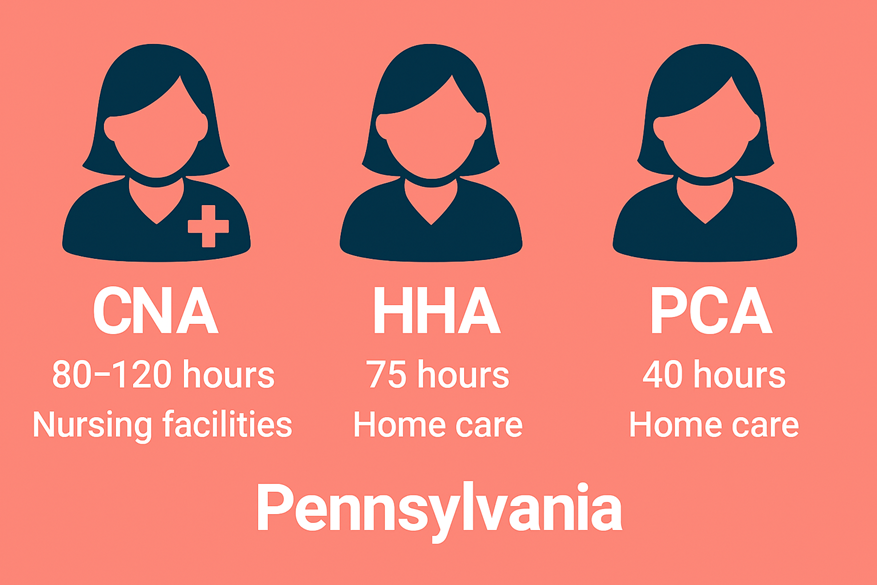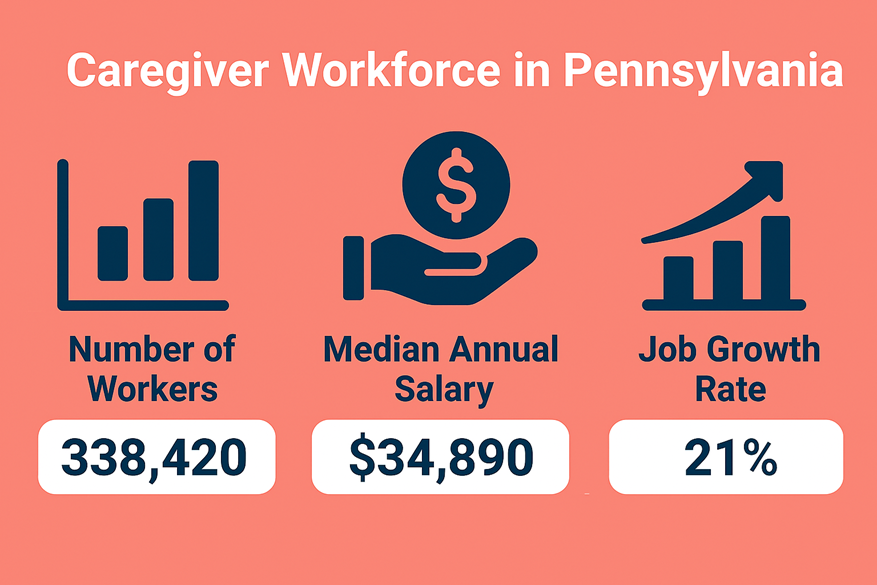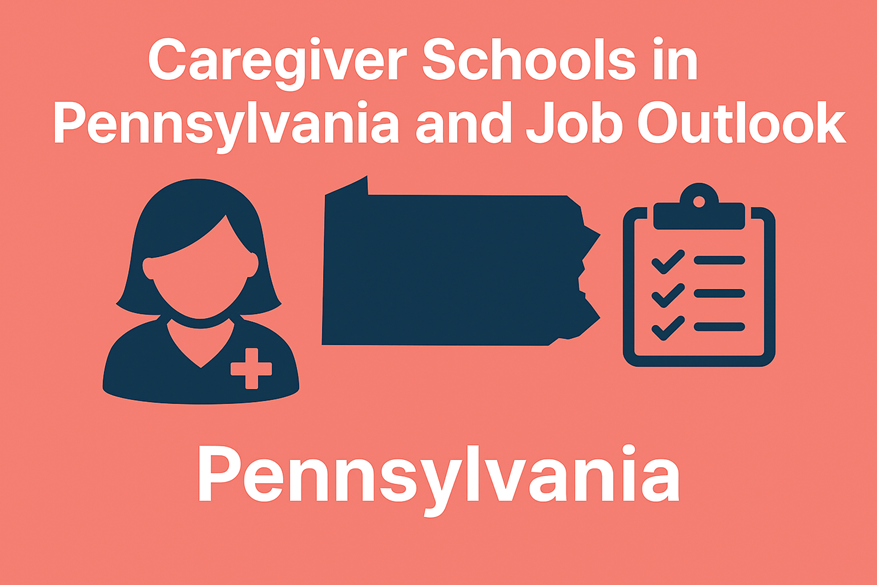Becoming a caregiver in Pennsylvania is more than just a job—it’s a growing opportunity in one of the most in-demand sectors of healthcare. With Pennsylvania’s aging population increasing rapidly, trained caregivers such as Certified Nursing Assistants (CNAs) and Home Health Aides (HHAs) are essential to supporting seniors, disabled individuals, and those recovering at home. Whether you’re just starting out or switching careers, this guide will walk you through the best schools, training options, licensing requirements, and workforce trends in Pennsylvania.
What Is the Difference Between CNA, HHA, and PCA?

While CNA, HHA, and PCA roles may overlap in caregiving duties, they differ in training, scope, and where they typically work.
Certified Nursing Assistants (CNAs) are state-certified professionals trained to provide basic medical care under the supervision of nurses. Their duties include taking vital signs, assisting with mobility, feeding, hygiene, and helping patients with daily activities in settings like hospitals, nursing homes, and long-term care facilities. CNAs in Pennsylvania must complete a state-approved training program and pass a certification exam.
Home Health Aides (HHAs) focus on personal care services in a home setting. They help clients with bathing, dressing, grooming, and sometimes light housekeeping or meal prep. HHAs may also monitor health changes, but they do not perform clinical tasks like CNAs. In Pennsylvania, HHAs are trained under federal guidelines, typically through home health agencies, with no state certification exam required.
Personal Care Assistants (PCAs), sometimes called caregivers or personal aides, assist clients with daily living activities but typically do not receive formal medical training. Their work may include companionship, errands, light cleaning, and help with personal hygiene. PCAs often work in private homes or assisted living facilities and are usually trained on the job.
In short:
- CNAs = medically focused, certified, and facility-based
- HHAs = personal care + basic health monitoring at home
- PCAs = non-medical support and companionship
Each role plays a vital part in the care continuum depending on a client’s needs.
Types of Caregiver Training Schools in Pennsylvania
Before enrolling, it’s important to understand the different types of caregiver schools available:
1. Public & Private Colleges
These institutions often offer CNA or HHA certification as part of a broader nursing or health sciences department. They tend to provide more robust student support services, financial aid, and career resources. However, they may also come with higher tuition or longer application timelines.
2. Vocational & Career Schools
Vocational schools are more focused on hands-on, career-ready training with shorter program durations. These schools often offer accelerated pathways and are a common choice for those looking to enter the workforce quickly. Some offer flexible class times, including evening or weekend classes, ideal for working adults.
Public & Private Colleges Offering CNA/HHA Programs in Pennsylvania
Vocational & Career Schools Offering Caregiver Training in Pennsylvania
Licensing Requirements for CNAs and HHAs in Pennsylvania
Certified Nursing Assistants (CNAs):
To work as a CNA in Pennsylvania, you must:
- Complete a state-approved CNA program (at least 80 hours of training, including 37.5 hours of clinical practice).
- Pass the NNAAP (National Nurse Aide Assessment Program) exam, administered by Credentia.
- Be listed on the Pennsylvania Nurse Aide Registry.
Renewal is required every two years, and you must have worked at least 8 hours for pay as a CNA within the last 24 months.
More info: PA Department of Health CNA Registry
Home Health Aides (HHAs):
Pennsylvania does not have a separate licensing board for HHAs, but federal regulations apply:
- Training must include at least 75 hours, including 16 hours of supervised clinical work.
- Many agencies require passing a written exam and background check.
- HHAs often work through Medicare-certified home health agencies.
Job Outlook & Demand for Caregivers in Pennsylvania (As of July 2025)

Pennsylvania’s senior population (65+) is projected to reach over 2.9 million by 2030, and the demand for personal care aides, CNAs, and HHAs continues to rise sharply.
According to the U.S. Bureau of Labor Statistics and Pennsylvania Department of Labor & Industry (July 2025 data):
- CNA Job Growth (2023–2030): Projected to grow 8%
- HHA/Personal Care Aide Growth: Projected to grow 25%
- Median Hourly Wage for CNAs: $18.00
- Median Hourly Wage for HHAs: $16.50
- Top Hiring Regions: Philadelphia, Pittsburgh, Allentown, Harrisburg, Erie
This growth is driven by Pennsylvania’s aging population, expanded Medicaid programs, and increasing demand for at-home senior care services.
Financial Aid and Free Training Opportunities
Many caregiver programs qualify for:
- WIOA (Workforce Innovation & Opportunity Act) funding
- PA CareerLink Scholarships
- Employer-sponsored training reimbursements
- Low-cost options at community colleges
- Nonprofits like HTTI and SEIU Healthcare offering no-cost programs to qualifying applicants
If cost is a barrier, contact your local PA CareerLink center or the school’s financial aid office to explore available grants or tuition waivers.
Choosing the Right Path
Becoming a caregiver in Pennsylvania is a meaningful, high-demand career with multiple entry points. Whether you prefer the broader resources of a community college or the focused speed of a vocational school, both offer valid paths to certification and employment. The key is choosing a program that fits your schedule, budget, and learning style—then taking the next step with confidence.
As Pennsylvania continues to face a caregiver shortage, there’s never been a better time to enter this field. Whether you plan to work in a nursing home, a private home, or pursue further nursing education, caregiver training can be your launchpad.
Disclaimer
This article is intended for informational purposes only. Program availability, pricing, and licensing requirements may change. Always confirm details with the program provider or official state licensing agencies before enrolling or making financial commitments.

